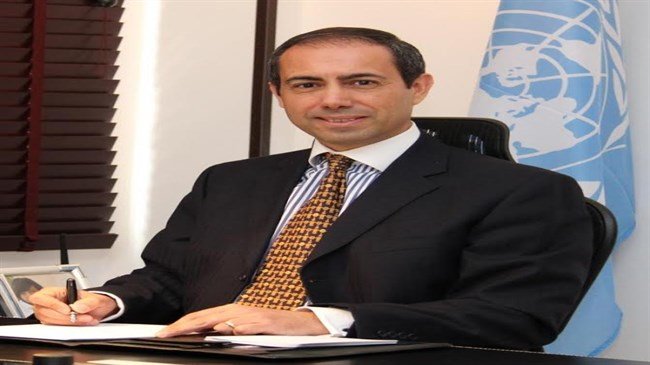Ending hunger in our lifetime despite a changing global climate

16 October is a date on which the global community commemorates every year World Food Day. As depicted by its title, this day has been designated to raise awareness of the significance of food security in enabling individuals to lead healthy and productive lives as well as for the well-being of societies as a whole.
Over the past decades, its commemoration has provided an opportunity for profound reflection on the plight of the hundreds of millions of people who are afflicted by hunger and malnutrition across the world.
Iran can undoubtedly play a pivotal role in demonstrating to other nations how a country can effectively address the twin challenge of embedding sustainably food security and managing the adversities of climate change.Notwithstanding the efforts that have been undertaken to address the debilitating and often pernicious scourge of hunger, a substantial proportion of the earth's vulnerable population continues to succumb to this bane.
The question that many pose is whether food security can be ensured for all in our lifetime. Can we enhance the level of agricultural productivity to meet the needs of an ever growing global population that will practically double over the course of the twenty-first century whilst redressing the threats of depleting natural resources and the tenuous strains of environmental degradation being prompted by, amongst other factors, climate change?
In responding to this question, this year's world food theme ("Climate is changing. Food and agriculture must too") has sought to delve into the need for promoting sustainable agricultural practices that factor in the adverse impacts of climate change.
Strengthening agricultural productivity from a quantitative perspective must be coupled with methodologically innovative 'climate smart' approaches that can safeguard sustainable food security applied in the light of ever growing global food demand.
As the global population increased from 1.6 billion in 1900 to 7.3 billion in 2016 and is projected to reach 9 billion by 2050, the Food and Agriculture Organization of the United Nations (FAO) estimates that agricultural production will have to increase by 60 percent by 2050 to satisfy the expected demands of food. To meet such a heavy demand, agriculture and food systems will need to adapt to the adverse effects of climate change and become more resilient, productive and sustainable.
As the global population increased from 1.6 billion in 1900 to 7.3 billion in 2016 and is projected to reach 9 billion by 2050, the Food and Agriculture Organization of the United Nations (FAO) estimates that agricultural production will have to increase by 60 percent by 2050 to satisfy the expected demands of food.By forging the concept of 'Climate-smart Agriculture', FAO is advocating an appropriate framework to develop the technical, policy and investment conditions to achieve sustainable agricultural development for food security under adverse climatic changes.
The magnitude, immediacy and breadth of scope of climate change on agricultural systems create a compelling need to ensure comprehensive integration of these effects into national agricultural planning, investments and programmes.
Although this predicament is certainly global in nature, the adoption of climate-smart agricultural practices is particularly pertinent for a country such as Iran.
Such practices should assist the nation in effectively confronting the complexity of the dynamics of the environmental changes it is progressively facing. Such an approach is deemed critical in the light of the acute ramifications of the forecasted environmental degradations such as water scarcity, land degradation and significant rises in temperature. In order to address these intertwined challenges effectively, food systems have to become both more efficient and resilient at every level, ranging from the farm national level.
Securing the efficient utilisation of natural resources has to be secured, comprising in terms of reduction in surface water use, land use as well as the use of inputs, so as the country can become more resilient to these changes and the resulting shocks.
The World Food Day commemoration in the country this year allowed for substantive deliberations on the intricate linkage between sustainable agriculture and the impacts being ushered by the variations in the climate and the consequent changes being felt. Engagement in this dialogue has fostered heightened awareness amongst a broader group of stakeholders at the national level, ranging from educational institutions to governmental and private sector fora.
By forging the concept of 'Climate-smart Agriculture', FAO is advocating an appropriate framework to develop the technical, policy and investment conditions to achieve sustainable agricultural development for food security under adverse climatic changes.
There is no doubt that in order to effectively tackle the pestilence of hunger and malnutrition, a myriad of interventions and programmes are required from different perspectives.
A number of institutions are extensively involved in such efforts that range from school feeding programmes such as the one being promoted by the World Food Programme to the community-based activities being carried out by 'Action contre la faim'.
These complementary initiatives are both necessary and essential. Equally significant is the need for integrated interventions aimed at reinforcing the institutional technical capacities at the national level, which embrace on the one hand enhanced productivity yet safeguard the country's natural resources.
FAO, together with the support of a range of stakeholders concerned from the various sectors and the participation of interested partners, will be engaged to promote the institutionalisation of the aforementioned approaches that will reinforce agricultural productivity and at the same time safeguard the country's natural resources.
Such collective efforts will undoubtedly contribute to enabling the Islamic Republic of Iran to sustain its nation's food security in the face these challenges and to meet the second Sustainable Development Goal of ending hunger and malnutrition by 2030 to which it ha subscribed last year.
Iran can undoubtedly play a pivotal role in demonstrating to other nations how a country can effectively address the twin challenge of embedding sustainably food security and managing the adversities of climate change.
Leave a Comment